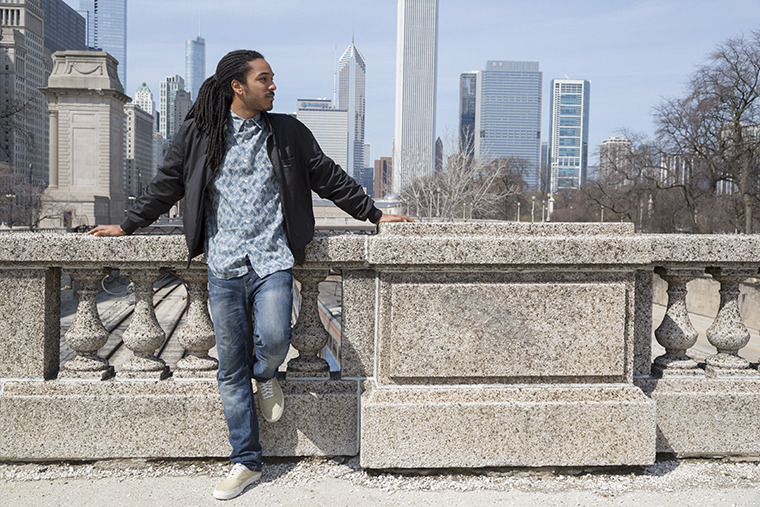Equator Club shaking up underground scene
April 28, 2014
The son of a nightclub owner, Emmanuel Egwu, aka Equator Club, has been immersed in the world of electronic music all his life. Using European influences and drum beats derived from his knowledge of music theory, Egwu creates music reminiscent of disco coupled with a strong R&B feel that transports the listener to a state of zen-like, rhythmic relaxation.
Egwu began producing music at age 12. His father, originally from Nigeria, owned a nightclub in Uptown named “Equator Club,” which is where Egwu’s musical moniker came from. He had the passion to establish his own party planning and promotions business, Them Flavors, and now works with international artists and music companies. He also teaches a workshop in Wicker Park through Columbia’s Community Arts Assistance Project.
To date, Equator Club has self-released three EPs, including Get A Hit, which was produced through Them Flavors in September 2013.
Egwu attended Columbia during the 2009–2010 academic year before moving to California “to find himself.” When he returned to the Windy City for job opportunities, Egwu chased his vision to promote and create music.
Every Thursday night, Them Flavors plays a DJ set at Primary Night Club, 5 W. Division St., featuring a rotating marquee of EDM producers every week, including artists such as Kill Frenzy and Autograf. Equator Club is scheduled to play a show April 30 at The Chop Shop, 2033 W. North Ave.
Egwu recently returned to Chicago after playing shows in Miami and said he hopes to tour more when Them Flavors requires less of his attention.
The Chronicle spoke to Egwu on the phone about the popularity of house music overseas, Them Flavors and his personal struggles as an independent artist.
THE CHRONICLE: When did you first get into music and start doing it professionally?
EMMANUEL EGWU: My dad, when I was younger, he owned a nightclub. I started producing when I was like twelve; I was pretty young. I was just messing around, not doing anything special, but I learned from that. When I was seven, I took piano [lessons] for a while and all throughout high school I took music classes. And then I went to Columbia for music business. I stopped producing at that point because I really wanted to get into the business side of music. Then I moved to California for about a year and I realized that I really wanted to just make music and not deal so much with the business side, so when I came back from California, I started Equator Club and I started releasing music.
CC: How would you describe your music?
EE: It’s mostly vibey/ house/ bass, but I do produce a lot of different kinds of music. I would say that I like worldly influences in most things. House music has definitely made the most impact on my production. I took [a] music theory [class], so a lot of my music [has] very lavish chord progressions and changes within the songs.
CC: What is your performance style like?
EE: I used to do a lot more live performance, but I do DJ now just because it became a hassle lugging around the laptop.
CC: What inspired Them Flavors?
EE: The first idea we had was to bring in artists that would otherwise never have a chance to play Chicago. We really wanted to bring in underground artists. We’re now more focused on creating an underground music community in Chicago. There are so many people who are craving that type of music in Chicago or a different scene than The Mid or Spybar to hear electronic music.
CC: Do you wish house music had a bigger following in the U.S.?
EE: There are arguments, but for the record, Chicago and Detroit are the birth places of house. In America, EDM is [played at] all the big festivals, but across the globe for the most part, it’s mostly house music. Unfortunately, in the U.S., it’s not as big of a culture. It’s slowly growing. I mean, Deep House and Disclosure and all that stuff has definitely changed what house can be seen as. Disclosure is playing a bunch of big festivals and they definitely have the old school house sound. I don’t really wish or hope that it would be that big because I feel like anything that gets that big is ruined in some aspect. I’m really about the underground scene. They’re doing something different than trying to be Diplo or Skrillex.
CC: Describe your song writing process.
EE: When I start a song, it’s with the drum pattern or the beat. A lot of inspiration I get for that is going out to clubs. I’ll be grooving and I’ll be like, “This is really tight” then I try and replicate it when I get back home.
CC: What are you working on right now?
EE: I was finishing up a remix for a singer from the U.K. The song is called “The Knife.” I have a few individual solo tracks I’m working on. I will be releasing an EP in mid-August and with another company I work with in the U.K. called “Dare Fresh.” They have a complication that they do.
CC: What has been your biggest struggle as an artist?
EE: It was always hard to find the right people. There [are] a lot of people in this industry, especially in Chicago—promoters or other artists who want you to succeed—but only to a certain point. A promoter would say, “Yeah, we want you to play this show, but we can’t pay you and you have to bring 20 people,” and I didn’t want to play that show anymore. I met the right people who really were motivated instead of pushing me forward just so they could excel.








